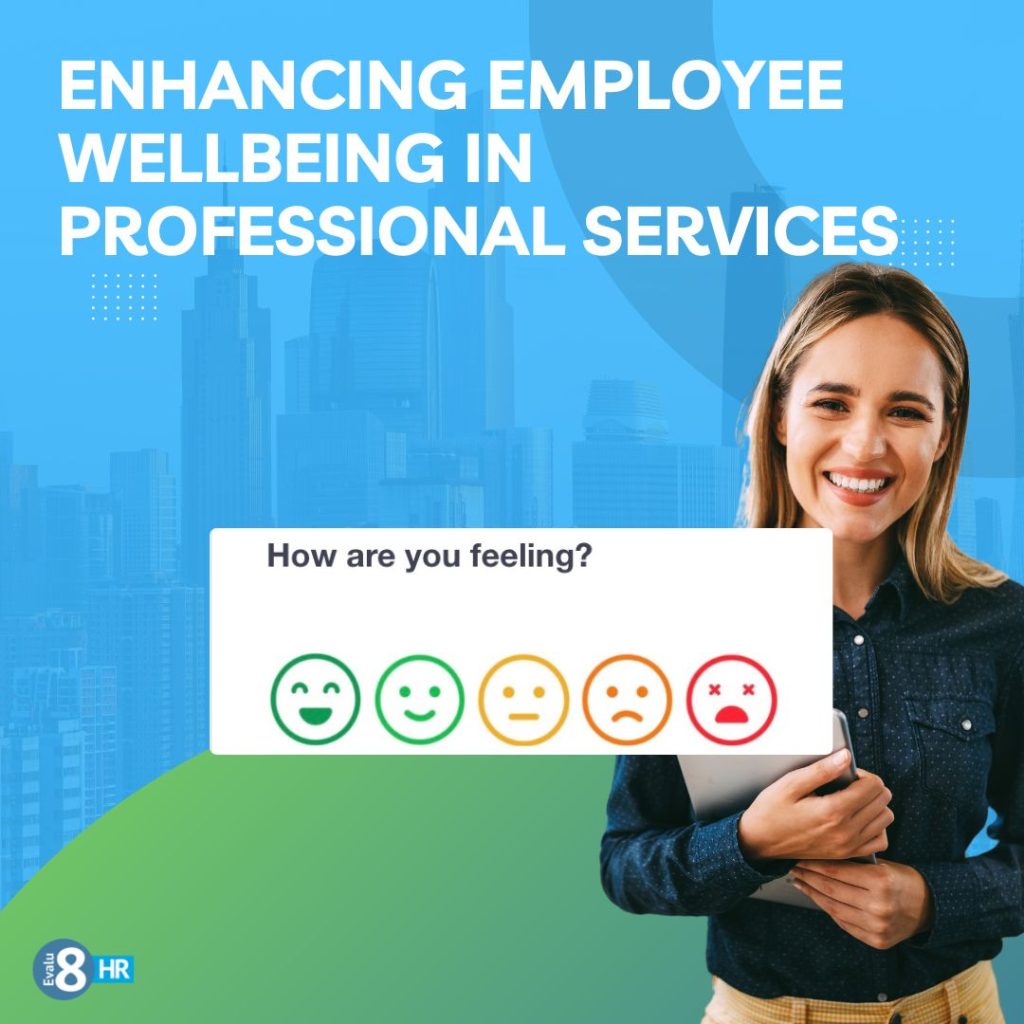In today’s fast-paced professional services industry, employee wellbeing has moved to the forefront of business priorities. Whether in legal, financial, or consulting firms, a healthy, engaged workforce is essential not only for employee satisfaction but also for the overall success of the organisation. Employee wellbeing is more than just physical health—it encompasses mental health, work-life balance, and a sense of fulfilment in one’s role.
As businesses increasingly recognise the link between employee wellbeing and productivity, it’s crucial for leaders to implement effective strategies that promote a supportive environment. This article explores key strategies that professional services firms can use to enhance employee wellbeing, creating a healthier, more engaged workforce.
TL;DR:
Employee wellbeing is essential for success in professional services. Here’s how firms can support their workforce:
- Create a Supportive and Flexible Work Environment: Offer flexible hours and remote work options to help employees balance work and personal life.
- Prioritise Mental Health: Implement mental health training, provide Employee Assistance Programmes (EAPs), and ensure regular check-ins with employees.
- Offer Holistic Wellness Programs: Encourage physical health with fitness incentives, on-site wellness facilities, and health screenings.
- Foster Inclusivity and Diversity: Promote a diverse workplace with bias training, employee resource groups, and inclusive leadership.
- Recognise and Reward Employees: Regularly acknowledge employees’ achievements with feedback, awards, and incentive programmes to boost morale.
By integrating these strategies, professional services firms can enhance employee wellbeing, leading to a healthier, more engaged, and productive workforce.

Creating a Culture of Support and Flexibility
Work-Life Balance: The Core of Employee Wellbeing
One of the most significant factors in employee wellbeing is the ability to achieve a healthy work-life balance. For many employees in professional services, long hours and high expectations are part of the job. However, this doesn’t mean organisations should overlook the importance of flexibility.
- Flexible working hours: Allow employees to have control over their work schedule, accommodating personal needs or family responsibilities.
- Remote working options: Offering the possibility to work from home a few days a week can significantly reduce stress and improve employee satisfaction.
- Results-oriented work environments: Rather than focusing solely on the number of hours worked, shift the focus to outcomes. This allows employees to manage their time more effectively and reduces the pressure to stay at the office.
By fostering an environment that values work-life balance, professional services firms can reduce burnout and increase long-term job satisfaction.
Actionable Tip
Encourage managers to have open conversations about work-life balance, offering tailored solutions for individual needs, such as flexible start and finish times or the option for remote work.
Prioritising Mental Health and Emotional Support
Fostering Mental Health Awareness
Mental health is one of the most overlooked aspects of employee wellbeing, especially in high-pressure environments like legal and financial services. As workloads increase and stress levels rise, employees often feel the weight of their responsibilities. Companies that prioritise mental health demonstrate a strong commitment to their employees’ overall wellbeing.
To address this, firms can implement several strategies:
- Mental health training: Educate managers to recognise the signs of stress or burnout and provide appropriate support.
- Employee Assistance Programmes (EAPs): These programmes offer confidential counselling services to employees, helping them manage personal and work-related issues.
- Regular check-ins: Managers should have one-on-one meetings with their team members to gauge their mental health and overall satisfaction, providing a safe space to discuss concerns.
By actively supporting mental health, firms can create a psychologically safe environment where employees feel valued, understood, and empowered to ask for help when needed.
Actionable Tip
Implement regular mental health check-ins as part of performance reviews or as standalone meetings. This helps build a culture of openness and support.
Offering Holistic Wellness Programmes
Physical Health: The Foundation of Wellbeing
Physical health directly influences mental wellbeing, and offering wellness programmes is one of the most effective ways to ensure employees feel physically and emotionally supported. In professional services, where sedentary work is common, providing opportunities for physical activity is essential.
Consider implementing these wellness initiatives:
- Fitness incentives: Offer gym memberships or subsidised fitness classes to encourage physical activity.
- On-site wellness facilities: If possible, provide employees with on-site gym facilities or relaxation rooms where they can decompress during the day.
- Health screenings and flu vaccinations: Regular health check-ups and vaccinations help employees stay healthy and reduce sick leave.
Actionable Tip
Encourage employees to take breaks throughout the day for physical activity. Set up team challenges like step competitions or offer rewards for participation in wellness programmes to make it fun and engaging.
Cultivating an Inclusive and Diverse Workplace
Inclusion as Part of Employee Wellbeing
A key element of employee wellbeing is creating an inclusive environment where everyone feels they belong. Employees who feel respected and valued, regardless of their background, are more likely to stay engaged and motivated in their roles. Diversity and inclusion (D&I) initiatives are not only important for company culture but are also essential for the wellbeing of all employees.
Here are some effective ways to promote inclusion:
- Bias training: Regularly conduct training to address unconscious bias and promote an inclusive mindset.
- Employee resource groups: Create spaces where employees from diverse backgrounds can come together to share experiences and support each other.
- Inclusive leadership: Leaders should model inclusive behaviour and ensure that all employees, regardless of gender, race, or background, feel equally valued.
By promoting a diverse and inclusive workplace, organisations show that they care about the wellbeing of all employees, which in turn improves retention and overall satisfaction.
Actionable Tip
Make sure D&I efforts are integrated into your recruitment, training, and leadership development strategies. Regularly measure your progress to ensure everyone feels included and supported.
Recognising and Rewarding Employees
Employee Recognition as a Pillar of Wellbeing
Recognition and appreciation play a significant role in employee wellbeing. Professional services often involve long hours and challenging work, so acknowledging the effort and hard work of employees goes a long way in maintaining morale.
Effective recognition strategies include:
- Regular praise and feedback: Ensure that positive feedback is given regularly—not just during annual reviews. A simple “thank you” or recognition of an employee’s contribution can go a long way.
- Employee of the Month: Recognise outstanding achievements with formal awards or shout-outs in team meetings.
- Incentive programmes: Offer bonuses, extra time off, or other rewards for high performers to demonstrate appreciation for their hard work.
Actionable Tip
Implement a formal recognition programme, where employees are recognised for achieving both personal and team milestones. Encourage peer-to-peer recognition to foster a supportive environment.
Transforming Wellbeing into a Competitive Advantage
Employee wellbeing is a critical factor for success in the professional services sector. By prioritising work-life balance, mental health, physical health, inclusion, and recognition, organisations can create a more engaged, productive, and loyal workforce. It’s clear that a focus on wellbeing not only improves employee satisfaction but also drives long-term business success. As the demand for flexible, supportive work environments grows, businesses that implement these strategies will be best positioned to attract and retain top talent while maintaining a positive, high-performing culture.
Here are the top five actionable takeaways from the article:
Offer flexible working hours and the option for remote work to help employees manage personal commitments while staying productive at work.
Implement mental health training for managers, offer Employee Assistance Programmes (EAPs), and schedule regular mental health check-ins to ensure employees feel supported.
Implement mental health training for managers, offer Employee Assistance Programmes (EAPs), and schedule regular mental health check-ins to ensure employees feel supported.
Invest in Diversity & Inclusion (D&I) initiatives such as bias training, employee resource groups, and inclusive leadership, ensuring all employees feel valued and respected.
Regularly recognise employee achievements through praise, employee of the month awards, and performance incentives to maintain high morale and job satisfaction.
Implementing these strategies will significantly boost employee wellbeing and create a more engaged, productive workforce in the professional services sector.


